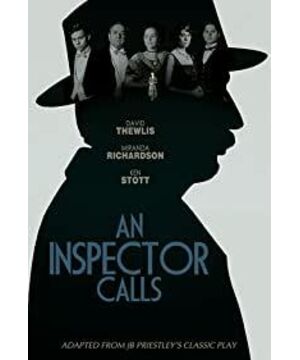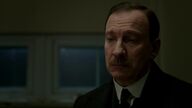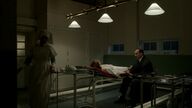——Can’t get the title and simply extract the keyword orz
Originally, I wanted to solve the headache and drowsiness caused by colds or staying up late. After the coffee bottomed out, I ordered the "task-based" movie viewing homework that needs to be completed before tomorrow night's class.
It turned out to be even more depressing after watching it...
In other words, he was in a bad mood and opened the video for entertainment, which made it worse. (because it's too heavy)
The first time I watched a movie so engrossed in it, maybe it was because of the atmosphere in the library where I had to hold my breath, or because of the objective requirements of the way the movie was narrated.
Personally, I think the most exciting part of the film is the last third, that is, the story after the "Detective" left.
Originally, I was very puzzled. The high-intensity trial process was performed to two-thirds of the time. Why is there such a long progress bar after the end, and it was not clear until the end. And at the beginning, I just focused on appreciating the poetic scenes under the beautiful soundtrack. If I didn't go back and watch it again, I would never know how many details that served the plot I missed.
The identity of the detective has always been a mystery that haunts my mind. I had some guesses when I watched it, but I was limited to taking this film as a realistic theme, and I couldn't understand it. After reading some film reviews, I suddenly realized.
Whether it's the phrase repeated at the beginning and end of the film ("Do you believe in God?—Yes.—How can you?—I can't believe in people. I have to believe in something, or I'd fall. Fall down through the cracks and never stop falling."), or the family's guess about the detective's name (Goold / Goole), all point to one word - "God" (or the original play written in other film reviews Ghoul (ghost) presented in . In the voice of God, standing on the moral high ground and overlooking everything, the words and actions of every member of the entire "House of Sin" are comical and absurd, and they are very in line with the concept of "original sin" in Western thought.
At the same time, the plot presented at the end of the film also made the detective have the identity of a "prophet". Combined with the previous line "What happened to her then may have determined what happened to her afterwards", I had to think of ancient Greece. and Predestination/Fatalism in Buddhism. The logic of the whole story is inseparable from the traditional western ideological foundation or religious background.
The factory picture at the beginning is exactly the same as "South and North" (it seems to be produced by the BBC), and the scene of the fluffy cotton wool is instantly recalled, and the comfortable soundtrack is also very touching.
Last semester's global history class about the industrial revolution period happened to be a group of workers, and it happened to be a typical report written in the United Kingdom. I was deeply touched by the background of "Sin House", and frowned while watching the film. want to cry. The story is not only about a beautiful female worker who committed suicide, but also a microcosm of the tragic fate of millions of people in the era of the Industrial Revolution. The dramatic lines in the film nakedly pose as an "educational film", and exporting values to the audience in such a straightforward manner also shows that its purpose is not only to expose the tragedy of the times, but also the tragedy of human nature. (like "Public men have responsibilities as well as privileges"; "There are thousands of XX with us, their lives and deaths, their hopes and fears, their misery and opportunities for happiness, all with our destiny , thoughts, sayings and practices are inseparable.” ;…) And I think the presentation and reflection of human nature may be more in line with the original intention of the film (and the original play). (Although there is a certain degree of Facebooking.
A phrase that can't be used any more, "no snowflake is innocent in an avalanche" - it fits the whole line of the story. The Chinese translation name is "House of Sin", which probably means that a tragedy is closely related to everyone who walks the path of the tragic protagonist's life. There is no fatal blow, no decisive factor, every person related to her, every little thing, every small setback experience, after continuous accumulation and accumulation for a long time, can be combined into a turbulent wave that can devour her life.
As for the narrative technique, with "Thunderstorm", "Oedipus King" and "Jiang Gong's Face", I vaguely understand why the teacher chose to discuss these works together in the past few weeks.
By the way, the performances of the leading actors are really wonderful, and the film's lens language can largely make up for the "regret" of the original stage play under the single form of presentation because of its natural advantages.
View more about An Inspector Calls reviews











